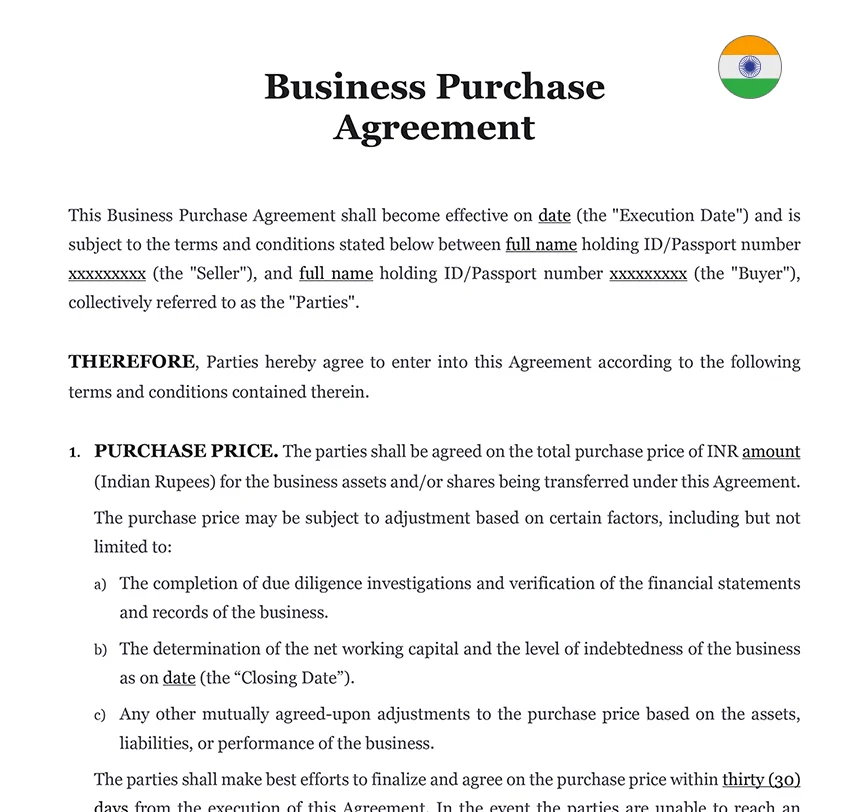
Download this business purchase agreement to outline the terms and conditions of the sale and purchase of a business, including assets, liabilities, and intellectual property.

Word Document (.docx)
 Business purchase agreement India" width="868" height="812" />
Business purchase agreement India" width="868" height="812" />
Ready to use legal template
Drafted by experienced lawyers
Compliant with Indian law
Ready to use legal template
Drafted by lawyers
Compliant with Indian law
In the dynamic landscape of business transactions, the process of buying or selling a business requires careful consideration and meticulous planning. At the heart of this significant undertaking lies the Business Purchase Agreement, a vital document that encapsulates the terms and conditions of the transaction. Whether you are an aspiring entrepreneur seeking to acquire an existing enterprise or a seasoned business owner contemplating a strategic exit strategy, comprehending the intricacies of the Business Purchase Agreement is essential to safeguarding your interests and ensuring a smooth and successful transition.
A Business Purchase Agreement is a legally binding contract that outlines the terms and conditions for the sale and purchase of a business. It specifies the details of the transaction, including the purchase price, assets being transferred, liabilities assumed, payment terms, representations and warranties made by the parties, and any additional terms relevant to the sale. The agreement provides clarity and protection for both the buyer and the seller, ensuring a smooth and well-defined transfer of ownership and assets.
Using a Business Purchase Agreement in India, or any other jurisdiction, is crucial for several reasons. Here are some key reasons why a Business Purchase Agreement is essential in India:
1. Legal Protection: A Business Purchase Agreement provides legal protection to both the buyer and the seller by clearly defining the terms and conditions of the transaction. It helps establish the rights and obligations of each party, ensuring that both parties are aware of their responsibilities and liabilities.
2. Clarity and Certainty: By outlining the specific details of the transaction, such as the purchase price, assets and liabilities being transferred, and payment terms, a Business Purchase Agreement brings clarity and certainty to the deal. It helps prevent misunderstandings or disputes that may arise in the absence of a written agreement.
3. Asset Transfer and Title: In India, the transfer of assets, especially immovable property, requires compliance with various legal formalities and documentation. A Business Purchase Agreement facilitates the transfer of assets by documenting the specific assets included in the sale and providing a clear record of the transfer of ownership or title.
4. Compliance with Laws and Regulations: India has specific laws and regulations governing business transactions, such as the Companies Act, tax laws, and sector-specific regulations. A well-drafted Business Purchase Agreement ensures compliance with these laws and regulations, minimizing the risk of legal complications or non-compliance.
5. Dispute Resolution: In the event of a dispute between the buyer and the seller, a Business Purchase Agreement provides a framework for resolving conflicts. It may include provisions for arbitration, mediation, or other dispute resolution mechanisms, reducing the time and costs associated with litigation.
6. Protection of Intellectual Property: If the business being sold includes intellectual property assets like patents, trademarks, or copyrights, a Business Purchase Agreement helps safeguard the rights and transfer of these assets, ensuring that they are properly transferred and protected.
7. Confidentiality and Non-Compete: A Business Purchase Agreement can include provisions to protect confidential information and restrict the seller from competing with the business after the sale. This ensures the buyer’s interests are safeguarded and prevents the seller from disclosing sensitive business information.
When drafting a Business Purchase Agreement in India, it is important to include the following key elements:
Identification of Parties: Clearly identify the buyer and the seller, including their legal names, addresses, and contact information.
Purchase Price and Payment Terms: Specify the total purchase price for the business and outline the payment terms, including the amount of any initial deposit, installment payments, or financing arrangements, if applicable.
Assets and Liabilities: Clearly define the assets and liabilities that are being transferred as part of the sale. This may include tangible assets (such as property, equipment, inventory) and intangible assets (such as patents, trademarks, customer lists). Outline the specific details of each asset and any conditions related to their transfer.
Representations and Warranties: Both the buyer and the seller should make certain statements and assurances about the business being sold. These representations and warranties ensure that both parties are aware of the current state of the business and that there are no undisclosed liabilities or issues. It is important to be thorough and include representations related to financial statements, legal compliance, contracts, and other relevant aspects of the business.
Closing Conditions: Specify the conditions that must be met before the sale can be completed. This may include obtaining necessary approvals, licenses, permits, or any other requirements mandated by Indian laws and regulations.
Indemnification: Define the obligations of the buyer and the seller to indemnify and hold each other harmless from any claims, losses, or liabilities arising from the transaction. Clearly outline the scope of indemnification and any limitations or exceptions that may apply.
Non-Compete and Confidentiality: Include provisions that restrict the seller from competing with the business being sold for a specified period of time and within a defined geographical area. Additionally, establish confidentiality obligations to protect sensitive business information and trade secrets.
Dispute Resolution: Specify the procedures for resolving any disputes that may arise during or after the sale. Include provisions for arbitration, mediation, or other alternative dispute resolution mechanisms as preferred by both parties.
Governing Law and Jurisdiction: Specify the governing law of the agreement, typically the laws of India, and the jurisdiction where any disputes will be resolved.
Miscellaneous Clauses: Include any additional clauses that are relevant to the specific transaction, such as conditions precedent, termination provisions, assignment of contracts, and any other provisions necessary to protect the interests of both parties.